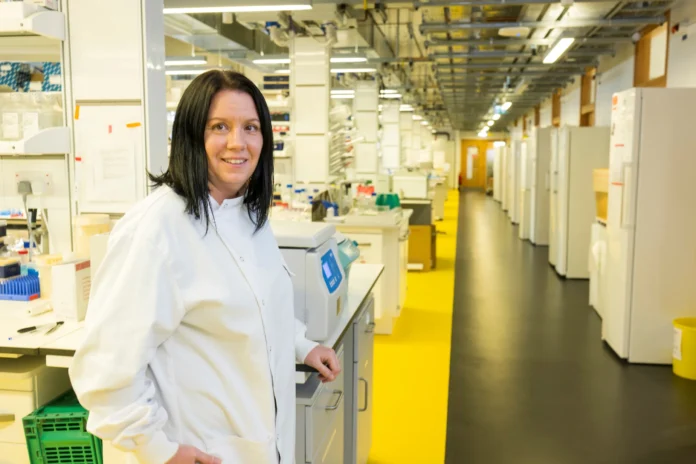Science
Researchers Uncover Breakthrough in Bowel Cancer Immunotherapy

A groundbreaking study from the University of Galway has revealed how bowel cancer can disable the immune system and how this process can be reversed to enhance treatment options. The findings, published in the Journal for ImmunoTherapy of Cancer (JITC), provide a new perspective on how to optimize immunotherapy for patients suffering from colorectal cancer.
Colorectal cancer, commonly known as bowel cancer, is one of the most prevalent cancers globally and ranks as the second leading cause of cancer-related deaths. Recent global analyses have indicated a substantial rise in cases among individuals under 50, with the incidence nearly doubling since 1990. In Ireland alone, over 2,500 new cases are diagnosed annually, underscoring the urgent need for effective treatment strategies.
Professor Aideen Ryan, a leader in Tumour Immunology at the University of Galway, emphasized the limitations of current immunotherapy approaches, stating, “While immunotherapy has revolutionized care in cancers such as melanoma and lung cancer, it has shown very limited benefit in bowel cancer, leaving patients with advanced disease with few treatment options and poor survival outcomes.”
The research team made a significant discovery: tumor stromal cells, which support cancer growth, actively reprogram the immune system. These cells switch off crucial tumor-fighting cells, such as natural killers (NK) and macrophages, hindering their ability to combat cancer effectively. Professor Ryan explained, “The interaction between the cancer, our body’s healthy cells, and our defense mechanism is a complex one, but our research shows that the cancer is essentially creating an immune brake—blocking the body’s natural response and fight mechanism.”
The study identified a specific enzyme responsible for this immune suppression, which produces sugars on stromal cells that bind to receptors on immune cells, effectively disabling them when immunotherapy is applied. By utilizing drugs known as sialidases to disrupt this binding process, researchers were able to reactivate the immune system’s response, leading to tumor shrinkage and preventing cancer metastasis.
The multidisciplinary research was conducted in collaboration with colorectal surgeons and pathologists at Galway University Hospital, led by Professor Aisling Hogan and Professor Sean Hynes. Furthermore, the study involved contributions from Dr. Philip Dunne of Queen’s University Belfast and experts from Palleon Pharmaceuticals in Massachusetts, USA, who are developing sialidase drugs targeting the sialoglycan-Siglec interaction.
In Professor Ryan’s words, “Our research is a clear breakthrough in our understanding of bowel cancer and how immunotherapy could be more successful. This world-first finding shows that some of the bowel cancer cells are not just passive bystanders; they are actively reprogramming the body’s immune cells, preventing them from doing their job.”
The implications of this research are profound. As Michael O’Dwyer, Professor of Medicine and Scientific Director of the University of Galway Cancer Centre, noted, “The work of Professor Ryan and her research team highlights an important interplay between cells within a tumor, facilitating disease progression and metastasis.”
Jim Broderick, M.D., Chief Executive Officer and Founder of Palleon Pharmaceuticals, underscored the significance of these findings, stating, “The sialoglycan-Siglec axis of immunosuppression in cancer was underappreciated until very recently. Targeting sialoglycan biology offers great potential for developing new therapies for diseases characterized by immune dysfunction, including cancer and autoimmunity.”
The pioneering research by Professor Ryan’s team is featured in the Breakthrough Cancer Research exhibition, titled “Cancer Revolution: Science, Innovation and Hope,” which is on display at Stephen’s Green Shopping Centre until October 31. The exhibition showcases striking microscopy images of stromal cells interacting with tumors and a 3D tumor model, emphasizing how these cells impair the immune system in bowel cancer.
This initiative not only highlights the innovative research being conducted at the University of Galway but also offers new hope to patients grappling with colorectal cancer and other malignancies that have resisted existing immunotherapy treatments. As the scientific community continues to explore these discoveries, the potential for improved therapeutic strategies becomes increasingly promising.
-

 Top Stories1 month ago
Top Stories1 month agoTributes Surge for 9-Year-Old Leon Briody After Cancer Battle
-

 Entertainment3 months ago
Entertainment3 months agoAimee Osbourne Joins Family for Emotional Tribute to Ozzy
-

 Politics3 months ago
Politics3 months agoDanny Healy-Rae Considers Complaint After Altercation with Garda
-

 Top Stories2 months ago
Top Stories2 months agoIreland Enjoys Summer Heat as Hurricane Erin Approaches Atlantic
-

 World3 months ago
World3 months agoHawaii Commemorates 80 Years Since Hiroshima Bombing with Ceremony
-

 Top Stories3 months ago
Top Stories3 months agoFianna Fáil TDs Urgently Consider Maire Geoghegan-Quinn for Presidency
-

 Top Stories1 month ago
Top Stories1 month agoNewcastle West Woman Patricia Foley Found Safe After Urgent Search
-

 World3 months ago
World3 months agoGaza Aid Distribution Tragedy: 20 Killed Amid Ongoing Violence
-

 World3 months ago
World3 months agoCouple Convicted of Murdering Two-Year-Old Grandson in Wales
-

 Top Stories3 months ago
Top Stories3 months agoHike Donegal’s Errigal Mountain NOW for Unforgettable Summer Views
-

 Top Stories3 months ago
Top Stories3 months agoClimbing Errigal: A Must-Do Summer Adventure in Donegal
-

 World3 months ago
World3 months agoAristocrat Constance Marten and Partner Convicted of Infant Murder









